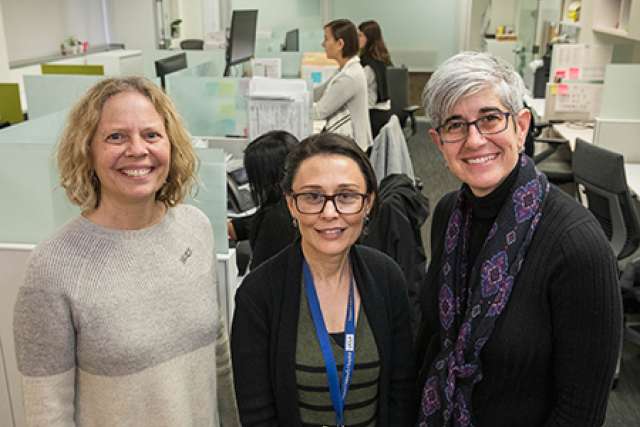To meet the rising demand for specialists trained to guide patients facing complex genetic disorders, the David Geffen School of Medicine at UCLA is introducing a new master's of science degree in genetic counseling.
Housed within the department of human genetics, the two-year program aims to broaden underserved populations' access to genomic medicine in Los Angeles, one of the most ethnically and racially diverse cities in the nation. A close alignment with the UCLA Institute for Precision Health and Institute for Society and Genetics will enhance cross-disciplinary training for students in the program.
Genetic tests can reveal increased risks of health problems, identify genetic variants that contribute to disease, help physicians tailor therapies to patients' unique genomes and evaluate patients' responses to treatment. In the past decade, genetic testing has gained popularity for the detection of cancer, autoimmune diseases, neurodegenerative disorders and other hereditary conditions.
The U.S. Bureau of Labor Statistics projects employment of genetic counselors to grow 27 percent from 2018 to 2028, much faster than the average for all occupations. U.S. News & World Report ranks genetic counseling as No. 11 of the top health care support jobs.
"Training the next generation of practitioners in this new era of precision health is a critical component of our educational mission," said Dr. Kelsey Martin, dean of the Geffen School of Medicine. "As a leading academic medical center and university, UCLA offers a unique environment for collaboration that prepares students to become innovators in genetic counseling research and clinical medicine."
According to the American Board of Genetic Counseling, 5,000 genetic counselors are certified in North America. Assuming one counselor per 100,000 people, the demand for genetic counselors in patient care is estimated to exceed supply until 2024. California and 23 other states offer licensure for genetic counselors.
UCLA is currently accepting applications for enrollment and will launch classes in the fall.
"We aim to train a student body that reflects California's diversity," said program director Christina Palmer, professor of human genetics and psychiatry at the medical school and the Jane and Terry Semel Institute for Neuroscience and Human Behavior.
Palmer, who is a genetic counselor specializing in deafness and psychiatric conditions and a member of the UCLA Institute of Society and Genetics, added that the program will provide students with an exceptional foundation to become leaders in the field of genetic counseling.
"As a microcosm of the world, Los Angeles offers a rare setting for advancing what we know about genetic diseases," said Dr. Daniel Geschwind, associate vice chancellor for precision health. "Diversity is critical to understanding genetic variations among all populations in order to accurately deliver targeted treatments."
Genetic counselors play a vital role on health care teams, providing risk assessment, education and support to individuals and families at risk for — or diagnosed with — a wide range of inherited diseases. They also interpret genetic test results, provide counseling and serve as patient advocates during the diagnosis and treatment process.
The birthplace of clinical exome sequencing and an original clinical site of the Undiagnosed Disease Networks funded by the National Institutes of Health, UCLA is uniquely positioned to train the future generation of genetic counselors.
"UCLA Health is an integrated health system where we have made precision health a priority," said Clara Lajonchere, deputy director of the UCLA Institute for Precision Health at the Geffen School of Medicine. "Genetic counselors are an important part of the precision health ecosystem and play a vital role in the delivery of patient-centered care."
Leonid Kruglyak, who is the chair of human genetics, said that the faculty in his department are incredibly excited to offer a clinically focused academic program.
"When we’re talking about translational medicine, this is a beautiful extension from the basic to the clinical, which is an important part of our department's mission," he said.
The inaugural class will begin the program in Fall 2020 and devote two years to coursework, fieldwork and an individual research project. The summer is reserved for fieldwork in Los Angeles or another region.
All students will complete fieldwork rotations in general, prenatal, pediatric, adult and cancer genetics. Specialty areas include neurogenetics, cardiogenetics, ocular genetics and fieldwork in commercial genetic testing laboratories.
"I recently gave a diagnosis to a young man who had been our patient for 17 years. Seventeen years with no diagnosis!" said genetic counselor Naghmeh Dorrani, associate program director. "There's currently no treatment for his condition, but that's the hope. Once you have a name, that’s where things start."



